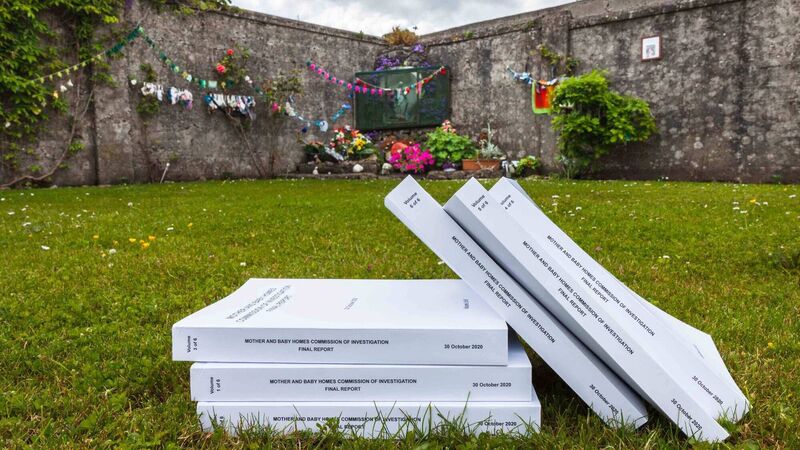Irish Examiner view: Final Mother and Baby Homes report must be repudiated

Mother and baby homes Commission of Investigation final report volumes 1 to 6 photographed at the Tuam site. Picture: Andy Newman
It is profoundly disappointing that members of the Mother and Baby Homes Commission have refused to appear before an Oireachtas children’s committee to answer questions about a report that continues to cause survivors suffering.
The fact that the news broke in the media was a further blow.
On Friday, the commission’s chairwoman, Judge Yvonne Murphy, strongly defended the report, and said its findings could be put in peril by an appearance before some of the committee’s members “whose rush to judgment without due process is already a matter of record”.
Survivors and advocates yesterday reacted furiously to that statement, saying they had been not granted “due process” by the commission, having been denied a copy of their testimony or any opportunity to comment on draft findings.
One of the key questions that remains to be answered is why there is such a gulf between the evidence outlined by survivors and their families and the findings of the report.
It is also unclear why a fraction of survivors, some 64, were invited to give evidence to the investigation committee, with judicial powers, while the vast majority (550) were directed towards the confidential committee, a body with no judicial powers.
Speaking at an invite-only academic event in Oxford earlier this month, commission member Prof Mary Daly said the confidential committee testimonies were not considered in the final draft of the report.
She said: “They were relied upon to the extent that the commission considered appropriate, having regard to the totality of the evidence gathered by the commission and before making its findings.”
That does nothing to address the many questions of survivors.
Neither does it explain why testimonies were misquoted, or why witness statements were reduced to a series of tick-boxes that were filled with cut-and-pasted bits of evidence.
Yesterday, children’s committee chairwoman Kathleen Funchion said there were so many holes in the report that it should not be allowed to stand.
Listening to survivors’ proposals is the only way ahead now, she said. She is right.
Claire McGettrick, co-founder of The Clann Project with human rights lawyer Dr Maeve O’Rourke, spells out what she believes those steps should be: repudiate the report, provide unconditional access to birth certs and personal records, open the administrative records, and expedite the safeguarding and centralisation of record.
The Clann Project directors, who have worked with survivors and adoptees for decades, say the report should be kept in the archive, but affixed with a notice saying that the State does not stand by its findings.
“It is a record of another harm that has been done to us,” she says.
How a process could so anger and upset the very people it was designed to help is a question that the Government must then answer, because it has far-reaching implications for transitional justice in the future.





